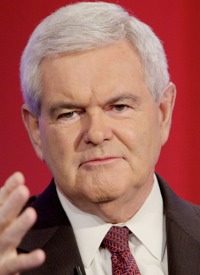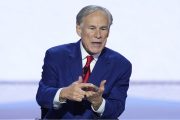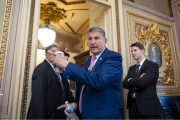
And should he win the nomination, the controversial Georgian plans to unveil a new "Contract With America" around Labor Day of next year. The "contract," or platform, Gingrich urged House candidates to adopt in 2004 set the theme for the Republican victory that year, as the GOP won control of the U.S. House for the first time in 40 years.
"I’m announcing my candidacy for President of the United States because I believe we can return America to hope and opportunity, to full employment, to real security, to an American energy program, to a balanced budget," Gingrich said Wednesday in a Tweeter and Facebook announcement, accompanied by a video. Citing his record of 20 years in the House, including the last four as Speaker, he said he "worked with President Ronald Reagan in a very difficult period. We got jobs created again, Americans proud of America, and the Soviet Union disappeared." As Speaker during the administration of Democrat Bill Clinton, he said, he achieved House passage of welfare reform, tax cuts, and balanced budgets, while employment increased. "We’ve done it before, we can do it again," he said, while challenging Americans to "look reality in the face" and make the tough decisions needed to "get the job done."
Appearing on Sean Hannity’s Fox News program Wednesday night, Gingrich blamed President Obama for the nation’s economic woes, particularly in the industrial heartland. He cited Texas, a Sunbelt state with a Republican Governor, as an example of how things could be made better. "I know how to get the whole country to resemble Texas," he said. "President Obama knows how to get the whole country to resemble Detroit." Yet he warned that Obama would not be easy to beat in next year’s election.
“Because first of all, he is going to say whatever he needs to, to win. Second, he’s going to have all of the advantages of the mainstream media, he’s going to have all the advantages of left-wing billionaires like George Soros. He’s going to have all the advantages of the Hollywood crowd. And they are going to go out and they’re going to have all the advantages of the unions. And so, they are going to try to raise a billion dollars for a very practical reason. He can’t afford to run in a fair election…. If he was on an equal playing field, he would lose.”
Gingrich, 67, has made frequent visits to the key caucus and primary states of Iowa, New Hampshire, and South Carolina in the past two years. He has made numerous television appearances and is scheduled to be interviewed Sunday on NBC’s Meet the Press. He announced the formation of his exploratory committee in early March. The former Speaker was reported to be considering a presidential bid as the 2008 primary season approached, and a spokesman said back then that the Georgia Republican would not enter the race unless he could raise $30 million in campaign contributions. Gingrich later denied he had any intention of running, saying at the time he would not want to give up his work with American Solutions for Winning the Future, a non-profit organization he founded. "I wasn’t prepared to abandon American Solutions, even to explore whether a campaign was realistic," he said.
But Gingrich had looked like a presidential aspirant back in 1995, the year Time magazine named him Person of the Year. After spearheading the Republican sweep in the previous year’s elections, Gingrich was elected Speaker and enthusiastically took on the role of either negotiating or pressing conflicts with Democrats in Congress and the White House on budget and policy issues. In June of 1995, he visited New Hampshire, the state with the first presidential primaries, ostensibly on a brief vacation trip for "moose watching" in the northern part of the state. But he arranged to have a "town hall meeting" with Clinton, who was also in the state at the time. The two got together in the western New Hampshire city of Claremont for a highly publicized dialogue that would be remembered for a highly publicized handshake over an agreement on campaign finance reform that was never enacted.
By the end of the year, Gingrich’s popularity plummeted, as he was widely blamed when his standoff with Clinton over the budget led to a brief and partial "shutdown" of the federal government. Gingrich’s negative ratings grew in part from comments that indicated his role in the budget battle was fueled, at least in part, by personal pique. He had complained that while traveling with the President on a trip to Israel to attend the funeral of Yitzhak Rabin, Clinton had not invited him to discuss the budget during the flight and had asked him to use the plane’s rear exit. Speaking with reporters after the trip, Gingrich said the snub was "part of why you ended up with us sending down a tougher budget resolution." Gingrich later conceded that comment was a mistake, but insisted the budget confrontation was not. Republicans retained their majorities in Congress the following year, despite a losing campaign by presidential nominee Robert Dole, the Senate majority leader whom Gingrich had once called the "tax collector for the welfare state." Republicans held onto the Congress, Gingrich said, "because when it came to a showdown, we didn’t flinch." The showdown led to the first balance budget in decades, he said.
During his two eventful terms as Speaker, Democrats filed 84 charges of ethics violations against him, all but one of which were later dropped. He later negotiated a settlement with the House Ethics Committee that included a reprimand over issues stemming from allegations he used a college course he taught to promote his election campaign. He also agreed to pay a $300,000 "cost assessment" to compensate the committee for money spent on the investigation. The IRS later cleared the organizations connected with the course of violating federal tax laws.
By 1998, some of his Republican colleagues saw Gingrich as a political liability, and a not very secret move was afoot in the House to replace him as Speaker. Late in the year, Gingrich announced his resignation, not just as Speaker but also from the House, to which he had just been elected for the 11th time. Dennis Hastert of Illinois succeeded him as Speaker. "I’m willing to lead but I’m not willing to preside over people who are cannibals," said an obviously bitter Gingrich. "
A fiercely partisan battler, Gingrich at numerous times during his congressional career enraged Democrats and others with the harshness of his rhetoric and his readiness to fire at the Democrats with whatever ammunition he could find. When a South Carolina woman deliberately drowned her own two children, Gingrich said the incident "vividly reminds every American how sick the society is getting and how much we need to change things," adding, "The only way you get change is to vote Republican." When comedian and film star Woody Allen said he had ended his afffair with Mia Farrow because he was romantically involved with the actress’s daughter, Gingrich said: "Woody Allen having non-incest with a non-daughter to whom he was a non-father because they were a non-family fits the Democratic platform perfectly."
But the "baggage" accompanying Gingrich in his quest for the White House includes his own infidelities in a biography that includes three marriages, two messy divorces, and an admitted extramarital affair he carried on while presiding over the House campaign to impeach President Clinton over charges stemming from the President’s dalliances with White House intern Monica Lewinsky. Gingrich has since become a convert to the Roman Catholic faith and has been speaking more of late on moral and religious values, either out of conviction or to appeal to social conservatives, or both. As the editors at National Review magazine observed, that could get him points in Heaven, "but there are no primaries there."
Photo of Newt Gingrich: AP Images



